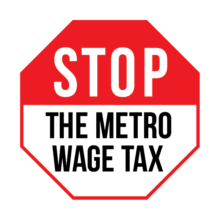Willamette Week Endorses a No Vote on 26-218
Measure 26-218
Transportation tax
No
The Metro Council referred this measure to voters in July after two years of preparation.
It would impose a new tax on companies that employ more than 25 workers, charging those companies up to 0.75% of payroll. Metro said at the time of referral it expected the measure to raise about $4 billion for transportation projects, including a new MAX line from Portland to Tigard, and bus and sidewalk improvements in 17 high-traffic transportation corridors. The tricounty agency also believes it can leverage nearly $3 billion in matching funds, mostly federal dollars for light rail.
The economics of the measure have been a little hard to pin down, for a couple of reasons.
First, although Metro modeled its tax on TriMet’s payroll tax, which local governments pay along with private employers, the agency decided at the last minute to exempt other local governments, claiming its legal authority to tax them was dubious. Despite requests from news media and opponents, Metro has never provided a legal opinion to justify that claim. Second, although the measure allows Metro to levy a tax of up to 0.75%, the agency has offered to drop that rate to 0.6% to generate support from business interests.
To its credit, Metro has attempted to prioritize transportation spending in underserved areas, such as 82nd Avenue in Portland, Tualatin Valley Highway in Washington County, and along McLoughlin Boulevard in Clackamas County. Projects in those areas would serve more people of color and low-income Oregonians who have historically not benefited from transportation improvements. The measure would also pay to convert a large portion of TriMet’s fleet to electric buses and enhance bus service in major corridors—as well as build 45 miles of new sidewalks, install 140 miles of bike lanes, and give transit passes to all high school students in the Metro region. Those would all be significant improvements.
So what’s not to like?
First, although Metro says, accurately, that climate change is an existential threat, its own figures show that this measure does virtually nothing to reduce carbon emissions. And critics say the highway improvements it includes would in fact encourage people to drive more.
Nobody knows whether the prepandemic commuting and traffic patterns upon which this measure was based will return after COVID-19 is in the rearview mirror. The measure was crafted on the assumption that workers will still head downtown each morning, but that is less than certain. So the measure proposes enormous expenditures for an environmental gain that is at best minimal and at worst illusory.
Second, economic literature is clear: Payroll taxes stifle job creation. That’s exactly the opposite of what Portland needs to rebound from economic catastrophe. Proponents have presented a grossly inflated number of jobs they claim the measure would create—37,500—while failing to note the jobs would come over 20 years, not now.
Third, Metro’s vague taxing policy raises issues of fairness. For instance, Providence Health & Services, a nonprofit that employs 18,000 in the region, would pay the tax, while Oregon Health & Science University, a nonprofit public corporation that employs about the same number, apparently would not. The failure of Metro to be careful and transparent about who would pay this tax will only exacerbate existing resentment—not just from business against government, but from anybody unlucky or unlawyered enough not to find a loophole.
Last but not least, we’re deeply troubled by the lack of a sunset provision for this measure.
Typically, money measures—such as those on the November ballot for Portland Parks & Recreation, the Multnomah County Library, and Portland Public Schools—have finite durations. This tax never ends, even after all the projects on Metro’s list are finished. It’s a vote for whatever Metro wants to build next, forever. Vote no.
